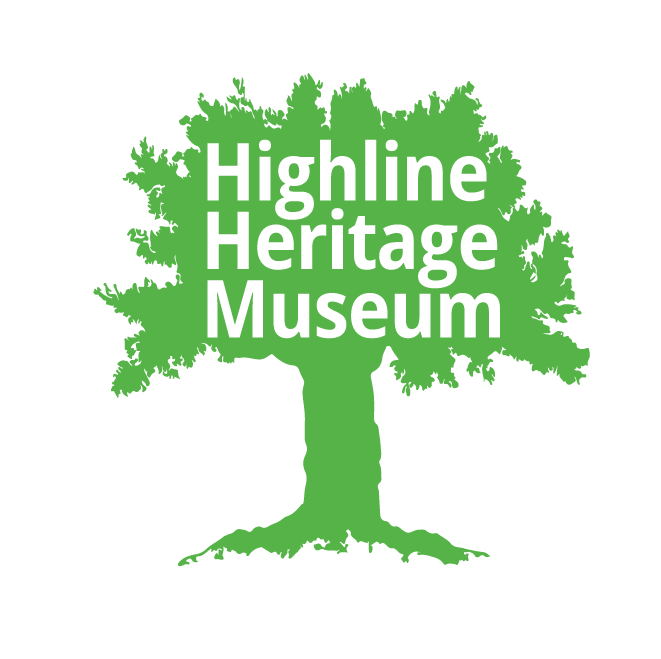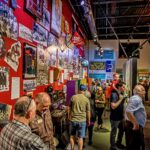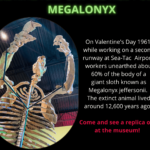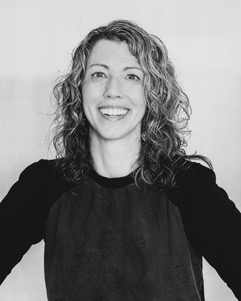To submit your Story – Email Us at info@highlinehistory.org
February was supposed to be the start of my new life. I quit a stressful, well-paying job and began a sabbatical, thinking that a pause from work would restore my health and sanity. I had grand plans for this time: I would edit the novel I finished last year and pitch it to agents. I would do things I never had the capacity for, like volunteering, road trips, soul-searching and spending time with my husband. Michael and I bought a house in Burien three years ago and, until I quit my job, I mostly saw it the dark before and after work, a cycle I wanted to change. By the end of 2020, I hoped to make a career change informed by these experiences.
Taking a break from work at forty-five, the peak of my earning years, felt risky. What if I couldn’t get another job? My fears of financial ruin aside, I knew I could not keep powering through work at a frenetic pace, ignoring its toll on my body, mind and attention. If I wanted to change my life, I had to invoke a pause. I copied a quote by the author Robert Poynton into my journal, which captured the adventurous spirit of my quest: “A pause allows to happen something that would not otherwise occur, and you never quite know what that will be.”
I did not imagine events unfolding as they have this spring.
Michael and I planned to kick off my sabbatical with a vacation to New Zealand so that I could decompress before diving back into my novel. Instead, we learned during my last week of work that he needed open-heart surgery—five bypasses and a new aortic valve. So began the season of conflicting emotions. We were crushed to see our dream vacation dashed, grateful that Michael’s cardiologist found the blockages in his heart and that they were fixable, afraid he might not survive the seven-hour surgery and relieved I didn’t have to deal with my job anymore.
On March 1, we read newspaper articles about the spread of coronavirus in Washington. If Michael caught so much as a cold, let alone COVID-19, they wouldn’t perform surgery, so he requested that I stay home from the gym and refrain from taking mass transit. If I got sick, I could infect him, too. The term self-isolate wasn’t yet part of modern parlance, but that’s what we did. Starting that Sunday, we canceled get-togethers with friends, which I had scheduled as loving send-offs before Michael’s surgery. Instead of working out, we walked around our neighborhood, Gregory Heights, and the Des Moines Trail out to the water. We adjusted our plans for life after Michael’s recovery. New Zealand was canceled, but we looked forward to a summer road trip to Walla Walla and Winthrop in July not knowing that this, too, would be canceled.
Cases of coronavirus escalated during the week of Michael’s surgery, yet it was hard to pay attention. We were engrossed in a giant binder of information intended to prepare us for his surgery and aftercare. The next six weeks were a blur. Michael survived surgery—twice—on March 12, a week before they stopped performing elective surgeries in Washington State. His surgeon suspected he was bleeding internally after the operation, so they opened him up again that evening to make sure. After fifteen hours in the hospital, they sent me home. There was nothing I could do but wait and pray. His surgeon called after 9 p.m. to say that Michael was alive and stable, but I found it hard to relax in the good news, knowing it could change. The next morning, I phoned the hospital and learned that visitors were not permitted—it was too risky for Michael’s health and that of other critical patients. Meanwhile, cases of coronavirus surged on the other hospital floors. Because I wasn’t there to witness his initial recovery, I was unprepared for the frail state in which they sent Michael home five days later. My plans to write dissolved as I assumed the role of caregiver. The word essential rose alongside social distancing in prominence, in reference to those upon whom we depended—health care workers, people who shopped for and delivered our groceries—and we, too, came to redefine what essential meant at home. Vacations, movies, teeth cleaning and haircuts were not as important as we imagined. Healthcare, food and shelter were essential—and time together. As he recovered, Michael began taking ten-minute walks with me outside, working up to longer jaunts each day. We were both thankful he was alive. Period.
We were also grateful for what could suddenly be done online, thanks to the pandemic. Michael resumed his study of Buddhism at the dharma center he belonged to back in Santa Cruz, California, which he was forced to give upon moving to Washington. I rejoined my yoga practice on Capitol Hill via Zoom. We felt grateful for each other. I realized that, by allowing myself to be so busy and miserable with work, I had taken Michael for granted for years.
By May, we were hungry for arts and culture. We watched a talk given by the writer Luis Alberto Urrea whose wife, it turns out, hails from Burien. Urrea spoke about his influences—growing up on both sides of the U.S./Mexico border, beloved family members he memorialized in novels, mentorship by Ursula K. LeGuin—and why he wrote the stories he did. Listening to Urrea, I realized what had been lacking in my own life and my writing: joy. Amidst the background of my job, I could not recall the last time I felt happy or unburdened. A background script of worries ran through my mind constantly—finances, responsibilities, guilt, self-improvement. Now, I added the fear that Michael could die at any moment. Urrea’s power as a writer resides in his ability to illuminate both the golden moments of his characters’ lives alongside heart-rending pain. His work illustrates the complex range of humanity. He makes us feel. After the program concluded, I opened the file that contained my novel and got to work.
Five days after Urrea spoke, George Floyd was murdered by a police officer in Minneapolis and anti-racist marches sparked to life throughout the country. We could not protest due to Michael’s compromised health, so we donated money, read books and articles on racism, listened to podcasts, and watched films and interviews with Black artists and historians to educate ourselves. It felt shameful that I had never done these things before. Why did it take the deaths of George Floyd, Breonna Taylor, Ahmaud Arbery and so many others to motivate me? I began to piece together my own participation in our racist, capitalist system that, barring the current upheaval, I probably wouldn’t have stopped to question. Why would I? I was a “good” person, which meant I had no work to do. No matter how much I have struggled financially, no matter how hard I have worked to scratch out a living, I could not see how a tailwind of white privilege pushing me forward. It took a succession of well-publicized murders of Black Americans for me to see my privilege as a white middle-aged woman, and the racism I have unconsciously perpetrated and promoted by not stopping to question anything.
The effects of the pandemic are far from over, but these first four months have shifted my perception of life in the United States. I have begun to think about the larger impact of whiteness in my life and identity—not only the color of my skin, but my part in upholding the brutality of American capitalism and its colonialist degradation of nature, the environment and indigenous peoples. Until now I had not considered that whiteness—the need to “blend”—is why my Italian and Jewish ancestors relinquished their language and culture upon immigrating here, and how I came to be born into the religion of materialism, the fashion of consumerism and the faith of the Almighty Dollar. Americans are told that work makes us free, that labor is a badge of courage, that self-worth comes from trading one’s physical and mental health, one’s life force, for a paycheck or the profit of a company. Even those who fight the system are ensnared in its punishments: poverty, prison, addiction and death. The false facade of America—land of the free, home of the brave—ignores the humanity of the millions it crushes and devours, a nation that feeds on itself to grow, killing ninety-nine percent of us, in body, mind and spirit. If the American Dream has not happened for you, it’s because you did not want it enough. It’s because you were lazy, not because the system failed you, not because the system was set up to fail you. People, having realized this in a new way during quarantine, are vigilant. Without the time and isolation of the pandemic, would we have gotten to this point as a nation?
Without the protests, the pandemic and the Great Pause, I know I wouldn’t have explored these thoughts. Without living through this current chapter of odious racism, I would not have interrogated my choices as a citizen or an author, though I should have. It shames me to admit it, but this is the beginning of the work white people must do. I openly acknowledge that, by my choices and neglect, I have been complicit in countless deaths of Black and indigenous people and people of color.
With the time afforded by my sabbatical (admittedly, another sign of my privilege) I am unpacking how my identity, and that of my characters, is bound by American nationhood and oppression. I am writing a different book today than the one I started in 2018. When I take a break from writing to walk our neighborhood, I consider whose land I’m crossing, who has died building our city, whose stories have been buried or gone unrecorded and who has been prevented from living here as I freely pass houses with my mask on. Every time a stranger waves, rather than considers me a threat based on the color of my skin, I remind myself this, too, is a privilege, though it shouldn’t be.
All is not lost. Every time I’ve felt afraid, I have also felt fortunate: for neighbors helping each other, for food and shelter, for a home with a yard in which I can grow vegetables, flowers and herbs. I am learning to grow food from seed like my great-grandmothers did because we may need to depend on our garden for sustenance. In some ways, I feel more vulnerable than ever, yet I also feel awake. Is that the trade-off? Realizing I don’t control anything despite the illusion that I used to? Realizing that nothing lasts, that death comes for us all and our loved ones, whether via cancer, coronavirus, heart disease or old age? I feel grateful for Michael’s returning health, and however long we have together. Because of his surgery, and the news, we now talk daily about death. Our conversations make me grateful for simple things, like bike rides and red dahlias. I am grateful the clouds of Juneuary are pushing off. Our lettuces and tomatoes are burgeoning. I experience frustration and loss—I miss hugging my friends, I miss hearing live music and seeing art, I miss going to the grocery store or the bakery to select my own food, I wonder how I’m going to get another job—and underneath it I know what’s bugging me is the drawn-out period of uncertainty none of us is prepared to wage.
It feels hopeless at times, this unending impermanence. (Here’s a secret: this is the true nature of life.) We do not know how our current limbo will settle and what the world will look like when (and if) it does. We don’t know when we will be able to travel, or travel safely. We don’t know if or when a vaccine will come to save us or whether schools or theaters will again be in full swing. We don’t know how many more people will be murdered until we change the role of police, jails, prisons, immigration and border control in our society. We don’t know how many more names of Black Americans we will say. We say we don’t want to revert to how things were, but the truth is, that crooked world contained familiar comforts we’re loathe to lose—or admit are already lost. As a species, we can no longer afford to milk everything for individual benefit without considering its impact on the collective. This tough work of changing what we value will involve relinquishing habit and convenience to save the planet and, ultimately, ourselves.
On a rainy April walk, Michael and I came upon a white rabbit nibbling grass in a corner yard on 19th Avenue SW. I stopped cold. I mean, in forty-five years, I have never seen a white rabbit hopping freely alongside the road—we’re talking Alice in Wonderland territory. I took it as a sign while Michael shrugged it off as someone’s escaped pet. Sure enough, in the months since, we have spotted other clusters of white rabbits on SW 170th and along 21st Avenue SW near 159th Street. The more regularly I saw them, usually after a rain shower, the more I began to think Michael was right: these were merely pets on the loose, nothing special. This week, I saw white rabbits in all three locations on the same walk, and I had a different interpretation. Maybe the they aren’t omens but reminders that small wonders do exist, which we’re too busy to notice most of the time. Before the pandemic, I never had the time to “waste” taking long walks around our neighborhood. Now that I walk our community nearly every day, I perceive continuity and change at a difference pace where before I saw houses passing in a blur.
Maybe the significance of the rabbits is that, once discovered, we can revisit pockets of wonder when we need to. Maybe it’s not about magic, but memory and knowing where to look. Maybe it’s a reminder to question what we believe at the moment we claim to understand the pattern at work around us. Maybe it’s a call to keep returning, keep practicing, keep delving deeper until change emerges. Maybe, in time, we will create something powerful, even surprising, from the ordinary.













